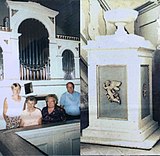Johann Tobias Turley
Johann Tobias Turley, also Thurley (4 August 1773 – 9 April 1829), was a German organ builder based in Brandenburg.

Life[edit]
Turley was born in Treuenbrietzen as the son of the baker Johann Friedrich Turley (1728–1783). After the early death of his father, he learned the same trade at the request of his mother. In 1793, he became a citizen and master baker in Treuenbrietzen. Turley was self-taught in organ building and in 1796 created a first organ in the Dorfkirche in Brachwitz.
In 1814, he gave up the baker's trade and turned entirely to organ building. From 1816 onwards, he received his first orders from the Potsdam government, such as for Hohenbruch.[1] The organ expert and organist in Neuruppin Christian Friedrich Gottlieb Wilke advised him to give the metal plates for the organ pipes equal surfaces by means of a rolling and stretching machine to be developed. Turley invented a corresponding rolling machine for the production of pipes and had it manufactured by the Königlich Preußische Eisengießerei in Berlin.[2] He first used the invention in his organ buildings in the Kreuzkirche in Joachimsthal and in Blankenburg (1817).[3]
Turley was married twice. On 31 October 1793, he married Maria Louise Bergmann from Treuenbrietzen, who died in 1808. His second wife was Marie Elisabeth Plötz, a divorced tailor's daughter from Wittbrietzen, whom he married on 4 May 1809.[3]
His son Johann Friedrich Turley II. learned organ building from his father and assisted him in the last years of his life..[4]
Turley died in Treuenbrietzen at the age of 55.
Selected works[edit]
Turley is said to have built 20 organs and carried out 30 repairs.[4] Some new constructions have been preserved. Instruments that no longer exist are set in italics.
New organ buildings
| Year | Location | Building | Picture | Manual | Casing | Notes |
|---|---|---|---|---|---|---|
| 1796 | Brachwitz | Dorfkirche |  |
First new organ | ||
| 1813 | Päwesin | Dorfkirche |  |
I/P | 8 | Based on headmaster 4', extended in 1854 by Gesell to I/P, 9, restored in 1983 by Ulrich Fahlberg.[5][6] → Orgel |
| 1814 | Beelitz | St. Marien und St. Nikolai | I/P | 12 | Built with parts of the previous organ, extended in 1847 by Gottfried Wilhelm Baer to II/P, 18, replaced in 1886 by Eifert.[7] | |
| 1815 | Berge bei Nauen | Dorfkirche St. Peter und Paul | 
|
I/P | ? |
Newly built around 1815, noted in the chronicle as "mehr schlecht als recht", unplayable in 1914 due to woodworm infestation, the tin pipes were given up in the First World War, replaced by painted pipes on plywood, replaced in 1938 by a new building by Alexander Schuke Potsdam Orgelbau from Potsdam, only the facade has been preserved, but redesigned in 2001. |
| 1817 | Hohenbruch near Kremmen | Village church | I/P | 10 | Commissioned by the Potsdam government; preserved.[8] | |
| 1824 | Kaltenborn | Village church | I | 6 | smallest preserved organ, newspaper May 1824 in wind chest, rebuilt several times, 2006 and 2011 restoration by Karl Schuke Berliner Orgelbauwerkstatt, Flöte 4' stop not playable.[9][10] | |
| 1824 | Altlüdersdorf Gransee | Village church | I | 8 | Without pedal, with son Johann Friedrich, according to an inscription in the organ; preserved. [11] | |
| 1827 | Lichterfelde, Uckermark | Village church | I | 4 | Purchase of an organ for 429 thalers on 30 August 1827, replaced in 1857 by Ferdinand Dinse.[12][13] | |
| 1828 | Nackel | Village church | I/P | 12 (9) | Attribution; preserved.[14] | |
| 1828 | Joachimsthal | Kreuzkirche | I/P | 14 | Disposition design in 1825, extensive rebuilding/new construction in 1909 in the old casing with some old pipes by Albert Kienscherf.[15] | |
| 1829 | Wildberg Prignitz | Village church | I/P | 19 (16) | Completed by son Johann Friedrich Turley.[16] |
References[edit]
- ^ Biography Archived 2016-01-11 at the Wayback Machine Treuenbrietzen.de,,viewed 29 Juny 2019.
- ^ Obituary: Johann Tobias Turkley, in Allgemeine musikalische Zeitung, vol. 31 (1829), column 552; Books google
- ^ a b Orgelbauer Institut für Orgelforschung Brandenburg, retrieved 17 February 2021.
- ^ a b Nekrolog Johann Tobias Turley. In Allgemeine musikalische Zeitung, no. 33, 1829, S. 551f., retrieved 17 February 2021.
- ^ Organ with disposition (Dutch)
- ^ Wolf Bergelt: Die Mark Brandenburg: Eine wiederentdeckte Orgellandschaft. Pape, Munich 1988, ISBN 3-921140-32-3, pp. 36f
- ^ Orgel Kirche Beelitz
- ^ Information Orgeldatabase (Dutch)
- ^ Orgel Kaltenborn Kirche
- ^ Orgel with disposition (Dutch)
- ^ Kurzinformation Orgeldatabase
- ^ Orgel und Geschichte des Ortes Lichterfelde
- ^ Heutige Orgel Institute for Organ Research, with incorrect year 1837
- ^ Information Organ database (Dutch)
- ^ Joachimsthal Kreuzkirche Institute for Organ Research Brandenburg, with history and disposition.
- ^ Information Orgeldatabase (Dutch)
Further reading[edit]
- Wolf Bergelt: Die Mark Brandenburg. Eine wiederentdeckte Orgellandschaft (Munich: Pape, 1988), ISBN 3-921140-32-3, pp. 35–37, pp. 103 f.
- Arthur Jaenicke: Tobias Thurley bäckt Semmeln und baut Orgeln (Berlin, 1960), biographic novel.
External links[edit]
- Literature by and about Johann Tobias Turley in the German National Library catalogue
- Kurzbiografie von Johann Tobias Turley Archived 2016-01-11 at the Wayback Machine
- orgellandschaftbrandenburg.de: Orgelbauer
- Allgemeine musikalische Zeitung. No. 33, 1829, pp. 551f.
